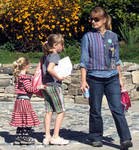7 x7 Seven Subjects & 7 things I learned December 10 & 11, 2012 Days 63 & 64
1. Math
a. 16% 1/6, 0.19 ( I compared fractions,
percents, and decimals from least to greatest
b. 7/4, 1 4/5, 200%
c. 8/9, 0.8889, 89%
d. I translated sentences into math 0.6 x
10
e. One third of thirty oranges = 1/3 x 30
f.
16% of 1/3 of 600 = 0.16 x 1/3 x 600
g. 60%
of ten dollars = 0.4 x 10
2. Science
a. What is a cell? A cell is the smallest unit of life, every
living organism is made of cells, cells arrange themselves in tissues to form
each organ and part in your body.
b. Is a cell alive? Yes, a cell shows all
the characteristics of a living thing So scientists assume that cells are
alive.
c. What do cells make up? Cells make up
living things like plants, animals, and humans. There are millions of cells
inside of you!!
d. What are the characteristics of a living
thing? The characteristics of a living thing are, behavior, reproduction,
energy transfer, organization, regulation, and growth.
e. What are molecules and organelles? A
molecule is a non-living part of a cell. It has a specific job or function. An
organelle is basically the same thing as a molecule except it has a different
job or function. One example of a molecule is the glucose molecule which gives
sugar to plants.
f. How does a cell reproduce? A cell
reproduces by expanding its membrane, which is like its skin, and then dividing
in two.
g. What is amoeba? An amoeba is a
microorganism, a one celled organism that performs all the characteristics of a
living thing.
3. History
a. I learned about the bicameral (bi = two,
cameral = chamber or house, ) This means that the legislative branch has two parts, the Senate and the house of
representatives.
b. Legislative, Executive, and Judicial are
the three branches of government.
c. The separation of powers is the idea the
all branches of government are equally important and no branch can take power
over another.
d. The constitution tells what the nations
laws are, what the powers and duties of the government are, and what the rights
of the American citizens are.
e. The framers of the constitution created
the constitution so that it could be amended if necessary.
f. The first change came in 1701 with the
Bill of Rights, the first ten amendments of the constitution.
g. James Madison is considered to be the
Father of the constitution.
4. Language
a. Echo et narcissus. Echo silva nympha;
Juno est pros, castigio Echo orare. Echo was a forest nymph; Juno, the goddess,
punished Echo for talking too much.
b. Narcissus venator est in silva. Echo
nympha havd dico. Narcissus is a hunter in the woods, Echo can’t speak to him.
c. Echo amat Narcissus est sal Echo voro
naricissus. Echo is in love with Narcissus, how can she tell him?
d. Narcissus voco “aceedo mi” Echo cogito
apello est puella. Echo respondat “aceedo mi”
e. Narcissus says, “Jopin me” Echo thinks
he’s talking to her, Echo responds “Join me”
f. Narcissus careo Echo amat, echo
lacrimat, narcissus iacat prope aquam. Amat filius imaginem. Narcissus rejects
Echo, Echo cries, narcissus rests by the water and falls in love with his own
reflection.
g. Iiupiter, narcissus muto, narcissus pulva
narcissus flova iacat prope aquam. Jupiter turned narcissus into a beautiful
narcissus flower which only grows by the water.
5. Reading
a. The Eagle: He clasps the crag with
crooked hands, Close to the sea in lonely lands, Ring’d with the azure world he
stands.
The Wrinkles Sea beneath him crawls, He
watches from his mountain walls, And like a thunderbolt, he falls.
b. This poem is about the description of an
eagle.
c. The simile that appears in this poem is.
“Like a thunderbolt, he falls.”
d. When the poet says “The azure world” he
is referring to the sky.
e. This poem is a lyric poem because it
sounds like music when you read it.
f. The rhyme scheme of this poem is aaa/bbb
g. Alfred, Lord Tennyson wrote this poem.
6. Writing
a. In Critical thinking daily Spark I learned
that the argument that they were giving was wrong because it was reductive.
b. In spelling and grammar daily spark I learned
when to use you’re and your.
c. You’re a terrible parent.
Your son has a serious behavior problem,
probably because you’re much too indulgent with him. Your child-rearings are
much too relaxed. You’re making a mistake if you think your “devil-may-care
approach to parenting will work. Your son doesn’t respect you, and if this
keeps up, you’re going to end up bailing him out of jail someday.
d. I feel bad that Harriet wasn’t invited.
e. Rudolph dances badly but at least he
tries hard.
f. Ms. Kramer spells badly so its lucky she
has a smart secretary.
g. The soup tasted bad on the first day and
even worse on the second.
7. Music
a. I learned a bunch of new chords on the
piano, like dm, G7, and E.
b. I learned how to play the introduction
to “Castle on a cloud.”
c. I learned how to transfer smoothly from
my diaphragm voice to my head voice.
d. I practiced my melodic intervals.
e. I learned about flat notes. Like D#
f. I sang “I dreamed a dream” again this week and worked on building up my
volume.
g. I used a metronome during piano to keep my
timing right.

No comments:
Post a Comment